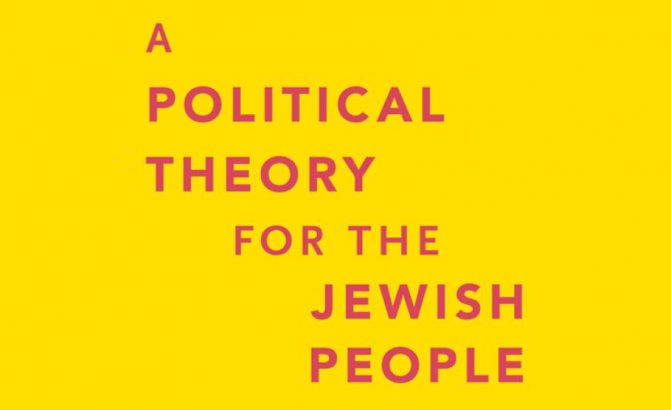Chaim Gans is a political philosopher and Professor of Law at Tel Aviv University. He is the author of Philosophical Anarchism and Political Disobedience (Cambridge University Press, 1992), The Limits of Nationalism (Cambridge University Press, 2003), From Richard Wagner to the Right of Return: Philosophical Analysis of Israeli Public Affairs (2006, in Hebrew) and A Just Zionism: On the Morality of the Jewish State (Oxford University Press, 2008). Professor Alan Johnson is the editor of Fathom and spoke to Chaim Gans about his latest book A Political Theory for the Jewish People (Oxford University Press, 2016) on 20 November 2016.
Part 1: Justifying Israel
Alan Johnson: I read your book as the most sophisticated and extended attempt we have to ground the justification for the Zionist project – or at least a certain version of that project – in the modes of thinking, the systems of concepts, the analytical resources and the language of political theory. But some people might make this objection to your project: why does Israel need justifying at all? People do not write books justifying, say, France, so why did you feel it was important to justify Israel?
Chaim Gans: But people are discussing the justifiability of many aspects of what France is doing, for example its laïcité. I don’t see any difference between the relationship of laïcité and France and the relationship of Zionism and Israel. Israel defines itself as a Jewish state which embodies the realisation of the Zionist dream. Countries such as the US, Australia, and Canada have also been preoccupied with the justifiability of their establishment. Israel’s establishment, at least if the argument of my book is sound, can be seen as just. Western attitudes toward Israel’s establishment confirm its justifiability. This is not the case with colonialism and of the establishment of the New World countries. Colonialism and its effects have quite rightly acquired a bad reputation. This led to opposite political processes. In Australia and North America it is a long time since anyone has argued in favour of colonialism as a just political idea and historical movement. And colonial ideas are not written into their constitutions. On the contrary, these countries seek to clear themselves of the crimes committed during their creation by acknowledging the criminal nature of the processes that brought about their establishment and by recognising the national and cultural rights of their remaining indigenous communities. If the arguments of my book are correct, Israel has gone in exactly the opposite direction. On the one hand, its creation and the goal in light of which this creation must be interpreted, namely providing a homeland for the Jews, were just. Furthermore, until not long ago the view that Israel has been justly established and should continue to exist to serve the goal for which it was established was widespread among almost all Israelis and in most Western countries. On the other hand, some decades ago Israel began pursuing policies that corrupt not only the justice of its present and future but threaten also the justice of its past. It seems to me highly important to investigate where exactly it went astray as a matter of political morality.
Part 2: Three Kinds of Zionism
AJ: Amos Oz says Zionism is a family name, not a first name. Central to your book is a comparative discussion of three conceptions of Zionism, which you label ‘Proprietary Zionism’, ‘Hierarchical Zionism’ and ‘Egalitarian Zionism’. Let’s begin with ‘Proprietary Zionism’. How do you define it, who would be a typical contemporary representative, and why are you dissatisfied with it?
CG: A current paradigm is the national-religious Jewish Home party, with Naftali Bennett as its leader. But I think the Likud, with Benjamin Netanyahu at its head, also understands Zionism in proprietary terms. And most Israelis, I think, interpret Zionism in those terms. That is to say, the justification for the Zionist project was and is Jewish ownership of the Land of Israel, which is understood to embrace not only Palestine but also the Kingdom of Jordan. Most Israelis believe that the Land of Israel is the property of the Jews. They do not insist now on dominating the Kingdom of Jordan, but this is only for pragmatic reasons, not principled ones. There is a nice quotation in Arie Naor’s book, The Greater Israel, of Menechem Begin’s words when he tried to assuage the fears of Jordan’s King Hussein about his intentions. Begin told Hussein: ‘We, as a result of the Holocaust, don’t have the strength and therefore do not have the desire to realise our rights to Transjordan.’ In other words, the Jewish non-control of Transjordan is not a matter of principle but a matter of the Jews’ inability to exercise their right to that country. Proprietary Zionism conceives of the entire Land of Israel as the property of the Jews, and considers Zionism to be no more than the physical restitution of a property to which Jews have been entitled since antiquity.
My reservations regarding this justification pertain to its moral foundations, the historiography that accompanies it, and its practical implications for Israel’s everyday politics. It presupposes a political morality according to which groups can unilaterally ‘seize an immense territory and keep it from the rest of the world’. These last words are from Rousseau. Proprietary Zionism requires distortions of pre-Zionist Jewish history. It must do so in order to refute the claim that the purported Jewish ownership of Palestine in antiquity lapsed a long time ago because of the Jews’ very long absence from Palestine. It thus relies on claims such as those stated in Israel’s Declaration of Independence, namely, that the Jews were forcibly exiled from their land and that they strove in every successive generation to re-establish themselves there. That these claims represent a historical distortion is confirmed not only by post-Zionist historians such as Shlomo Sand, but also by mainstream establishment historians such as Anita Shapira and Israel Bartal, who have shown them to be historical fictions.
However, the main problem with Proprietary Zionism is not its distorted moral and historical foundations but rather its practical implications for current Israeli politics. If the Jews are the owners of Palestine, then the Arab inhabitants of Palestine are the holders of stolen property, at least as a collective, and therefore shouldn’t be granted collective rights. Kahanists [followers of the late racist Meir Kahane] and prominent settlers would hold that also as individuals they have no rights in Israel/Palestine, not even a right to reside there (they wish to expel them). This means not only deep inequality between Jews and Palestinians in Israel/Palestine, but a mass violation of the latter’s human rights on a daily basis. This moral catastrophe is our reality.
Hierarchical Zionism
AJ: How do you define ‘Hierarchical Zionism’, who would be a typical contemporary representative, and why are you dissatisfied with it?
CG: The typical representatives of Hierarchical Zionism are well-regarded academics such as Ruth Gavison, Amnon Rubinstein and Shlomo Avineri, and a number of Supreme Court Justices. They justify Zionism by reference to the universal right to national self-determination, to which I would not object. However, they interpret this right as a right to a state which, in Gavison’s words, ‘[…] offers special benefits to the people with whom the state is identified [and] at the same time, […] puts those citizens who are not members of the preferred national community at a disadvantage.’
This definition is misleading in a scholarly sense, both in international law and in political theory. However, its main problem is that it is morally pernicious. It sanctions, as a matter of constitutional principle, inequality among homeland groups belonging to, and living in, the same country, whereas the only inequality that can be constitutionally sanctioned among groups living in the same country is between homeland groups and immigrant groups.
Homeland groups have collective rights to self-determination in their countries. In Germany, only the Germans enjoy such rights because they form the only homeland group there. The Turks residing in Germany have no such rights. In Canada the Anglophones have self-determination rights, as also do the Francophones and First Nations, because they are all homeland groups there. Sikhs in Canada have no such status. Hierarchical Zionists argue as if this were not the case, or as if the Arabs in Israel were similar to the Sikhs in Canada and the Turks in Germany.
AJ: You debated these issues with Ruth Gavison at the EAIS conference in London recently. How did she respond to your argument?
CG: The truth is that the Hierarchical Zionists do not respond. My criticism of their position was published in an earlier book, A Just Zionism. They have not responded in writing and I have not heard any convincing response when I talk to them.
Gavison argues for hierarchy by wrongly defining the right to national self-determination in a way that allows for inequality between homeland groups. Amnon Rubinstein and Alexander Yakobson argue for it in their book, Israel and the Family of Nations, as a matter of comparative politics. They try to show that Jewish ethno-cultural hegemony, as it is institutionalised in Israel, is akin to many similar cases the world over. In my book I contested the validity of their comparisons, but they haven’t responded. They mention Greece’s preferential immigration policy for ethnic Greeks and consider it analogous to the Israeli Law of Return; but they fail to note that the Greek policy does not bar individuals who are not of Greek origin from entering Greece and acquiring citizenship there. They refer to Germany’s preferential treatment for immigrants of German ethnic origin, but they omit any mention that this does not apply to all ethnic Germans – for example, Donald Trump and other Americans of German ethnic origin – but only to East European ethnic Germans and (mainly) citizens of the former Soviet Union who suffered discrimination under that regime. Yakobson and Rubinstein also do not mention that Germany and Greece are each the homeland of a single ethno-national group: Germany for the Germans and Greece for the Greeks. Israel, in contrast, even within its 1967 borders, controls territories that are homeland to both Jews and Palestinians. That being the case, Israel should draw analogies not necessarily with Greece and Germany but rather with other multi-national countries such as Britain, Switzerland, Canada, Romania, Slovakia, and Macedonia. As a country with liberal pretensions, perhaps it is worthwhile for Israel to draw analogies with the first three of these and not with the rest. All this is in my book. But Yakobson and Rubinstein haven’t responded. They certainly haven’t responded to my non-comparative politics argument, namely, that their comparative arguments are of the ‘everybody does it’ type applied in a context of a substantively unjustified behaviour.
AJ: What would you say if they put this argument to you: ‘There is an exceptional history of persecution and oppression of Jews which justifies the exceptional character of the state, in terms of things like the Law of Return?’ You would not support that claim?
CG: I would support that claim. But I would do so in a much more detailed and qualified manner. I would say that Jews who are being persecuted should have the right to immigrate and automatically become Israeli citizens if they so wish. Though I would not support all Jews’ right to immigrate to Israel just by virtue of their being Jewish, I would support granting Jews priority within immigration quotas which allow also non-Jews to immigrate to Israel. And I would limit that priority to Jews who individually interpret their Jewishness in terms of nationhood. I wouldn’t grant them Israeli citizenship unless they demonstrate their commitment to the nationhood conception of their Jewishness by studying Hebrew and becoming integrated in Israeli culture and society. Under the present legal regime, citizenship is automatically granted to every Jew who immigrates to Israel just by virtue of his being Jewish. Non-Jews are almost barred from becoming citizens unless they have a kinship relationship with Jews.
Egalitarian Zionism
AJ: Your own commitment is to ‘Egalitarian Zionism’. You make the case for this as a conception of Zionism, and a way of being Zionist, which is not just an alternative to ‘Proprietary Zionism and ‘Hierarchical Zionism’ but is also an alternative to ‘Post-Zionism’ or anti-Zionism, developed, among others, by the so-called New Historians in Israel in the 1990s.
CG: Zionism has moral justifications other than viewing the historical ties between the Jews and the Land of Israel as proprietary ties or viewing the right to self-determination as a right to become the only Favorit-Volk in a country. One such justification stems from an egalitarian conception of the right to self-determination. Another stems from the centuries–long persecution of the Jews in Europe and its continuation in the 19th century despite their emancipation there. A third justification revolves around the historic bond between the Jews and Palestine which I understand in terms of identity rather than in terms of property. Additionally, these three justifications must be read only jointly and not separately. It is only under such a reading that they can provide sufficient justification for the establishment of the State of Israel. If these justifications are interpreted in this way, then on the one hand they allow an interpretation of Zionism that does not turn it into the type of active proprietary nationalism it has become in the last few decades, and on the other hand they do not compel Israeli Jews to give up Zionism in favour of the solutions post-Zionists propose for Jewish life in the Land of Israel and outside it.
The cornerstone of this threefold justification of Zionism is the Jews’ equal and universal right ‘to be masters of their own fate, like all other nations’ (the quotation is from Israel’s Declaration of Independence). However, the right to national self-determination cannot be a sufficient justification for Zionism because it cannot explain why the Jews needed to realise their self-determination specifically in Palestine. In order to justify this core element of Zionism, one must resort to the historical ties between the Jews and the Land of Israel. However, these ties need not be interpreted the way most Israelis interpret them, namely, as a basis for ownership claims. They should be regarded as an argument for the importance of the Land of Israel for the identity of the Jews as a nation, and therefore as the basis for selecting the Land of Israel as the geographical site for the realisation of Jewish nationhood.
These two justifications – namely, the universal right to self-determination, and the identity ties between the Jews and the Land of Israel as grounds for selecting Israel as the site of Jewish self-determination – can constitute part of a global theory of multilateral justice under which the world is divided among all its nations. They do not derive from a unilateral theory of justice as proprietary theories do.
Most nations claim a right to self-determination and most of them realise this right (one way or another) in their homeland. However, the majority of the members of other nations are concentrated in one place and share a history and culture in that particular place, which is also the place of birth of most members of the group and indeed of the group itself. This was not the case with the Jews at the time of the inception of Zionism, and today it is only partially the case. More importantly, the particular place in question is the homeland of another group and the birthplace of the members of this group.
To overcome this difficulty, the Zionist movement and Israel’s Declaration of Independence emphasised the persecution of the Jews and the Holocaust, which generated an urgent necessity. This was used in addition to the Jews’ historical ties to the Land of Israel in order to justify the choice of this particular place for the purpose of realising Jewish self-determination despite the fact that it was inhabited by Arabs. This necessity argument is very similar to the necessity defence in criminal law which is often invoked to justify acts that would be legally and morally prohibited under normal circumstances, or at least to excuse from liability those committing these acts. An example in which necessity incontrovertibly justifies an act that otherwise would be considered criminal and immoral is that of the mortally wounded person who has no way of saving her life other than by breaking into a pharmacy to steal the medicine she needs.
AJ: Let’s examine some of the claims you make for Egalitarian Zionism. What does Egalitarian Zionism say about the territorial scope of Jewish self-determination in the Land of Israel, given what it says about the existence of another homeland group there?
CG: If the full justification for the realisation of the Jewish right to self-determination in Palestine despite its Arab character depends on the necessity created by the persecution of the Jews, then the territorial scope of this self-determination cannot exceed the boundaries that existed when that necessity existed: that is, the borders of Israel as set at the end of the 1940s, immediately after the Holocaust. These borders, initially demarcated in the partition resolution adopted by the UN General Assembly in 1947, were established in 1949, at the end of the war that broke out in the wake of the Arabs’ refusal to accept the partition resolution. These borders, the subsequent 19 years of relative stability and empowerment which the Jews enjoyed, and Israel’s overwhelming victory in the 1967 Six-Day War put an end to the urgent need that justified the realisation of the Jews’ self-determination in the Land of Israel.
AJ: And what are the implications of Egalitarian Zionism for the position of Israel’s Arab citizens, relative to the Jewish citizens, in terms of the conception of the rights that they should hold – individual, civic, collective, national, and so on?
CG: Constitutionally, the Arabs should be equal to the Jews within the 1949 borders of Israel, and therefore be represented in Israel’s public space and politics on a pro rata basis. At least constitutionally, Israel within the 1967 borders should think of itself like all countries that have more than one homeland group, that is, as a country that does not belong to one nation but to more than one. An exception could be made with regard to immigration, if there is a Palestinian state adjacent to Israel which privileges Palestinian and Arab immigration into it. Another exception could be made in matters of defence and security, which, given Jewish history in general and in Israel/Palestine in particular, should be controlled for the foreseeable future by Jews. However, even without these exceptions, the country, though it would not be only Jewish, politically would be mainly Jewish, since 80 per cent of its population would be Jewish.
AJ: The points you make about two states, the 1967 borders, collective rights for the Arab minority, may have been expected by most readers. But you also claim in the book that Egalitarian Zionism would produce ‘more stability in the end state arrangements’ of any final status arrangement, than either Proprietary Zionism or Hierarchical Zionism. That was not expected. Why do you make that claim?
GC: The point about the 1967 borders being appropriate for a two-state solution may have been expected by most readers, but not the fact that it can have an inherently Zionist logic. Most people think of these borders as an appropriate compromise between Zionism and the Palestinians, not as demanded by Zionism itself. I myself wasn’t aware in my A Just Zionism (OUP, 2008) that it could be justified within Zionism. I justified it there as a morally required compromise between Zionism and Palestinian nationalism. It became clear to me that Zionism itself requires it only when I compared Egalitarian Zionism with the other interpretations of the Zionist political idea in my last book.
Regarding my claim that Egalitarian Zionism would produce more stability for the end-state arrangements than the other alternatives (I mainly mean Proprietary and Post-Zionism): I think this is so because Proprietary Zionism and post-Zionism each consider one of the parties to be the owner of the land and the other to be its plunderer. The chances are not very high that many Palestinians would become convinced by Proprietary Zionism that they or the collective to which they belong are the plunderers of Palestine. The same holds for the Jews. Not many of them would become convinced that they or the collective to which they belong are plunderers, as is implied by the post-Zionist conception of Zionism as sheer colonialism. Therefore, under these conceptions of the conflict, an end-state arrangement between the conflicting parties cannot be anything but a modus vivendi reached for pragmatic reasons. The strength of pragmatic reasons depends on changing circumstances, and therefore a settlement based upon them cannot be stable. Moreover, if most members of each party continue to view the other party as the plunderer of their land, the motivation to breach the arrangement would be very strong indeed on both sides.
This argument for the expected instability of settlements based on Proprietary Zionism or post-Zionism is inspired by John Rawls’s stability-based argument for the superiority of his conception of justice to the utilitarian conception. The latter can end up demanding that people become slaves, in which case it is reasonable to expect them to refuse to accept the implications of the utilitarian conception. On the other hand, a settlement premised by Egalitarian Zionism would conceive of the two parties as having equal status, the status of victims: the Jews as victims of the Europeans and the Palestinians as direct victims of the Jews and indirect victims of the Europeans. This conception is historically more plausible and morally less humiliating. There are better chances that many members of both parties would be ready to accept it. Moreover, the details of the settlement between them, especially the territorial partition along the 1949–1967 Green Line, is entailed by principled considerations of justice which, unlike pragmatic considerations, do not depend on changing circumstances. Clearly, if many members of each collective internalise the egalitarian conception and its implications for the end-state solution, this solution would be as stable as human settlements can be and surely not as unstable as settlements reached for pragmatic reasons while offending one of the parties’ sense of justice.
Part 3: Meeting the Post-Zionist Challenge
AJ: Let’s move on to your critique of post-Zionism. Let me say, post-Zionism has become, at least in certain quarters – parts of academia, Churches, NGOs, trades unions and the Left – a common sense. Its leading proponents, such as Ilan Pappe, have influence and authority in those quarters. I find the critique of post-Zionism in the UK is often simplistic, even embarrassing. It rarely rises to the level of the challenge posed by post-Zionism. My excitement about your book was that, at least in a philosophical register, it does. I believe yours is a genuine critique in the sense of a real appreciation of the strengths of the post-Zionist work of the New Historians in the 1990s, but also a critique of the political and normative generalisations that writers like Ilan Pappe have drawn from that work. If we begin with the strengths, you argue that the post-Zionism mounts a triple challenge that knocks down ‘Proprietary Zionism’ and ‘Hierarchical Zionism’ but does not knock down ‘Egalitarian Zionism’. You write of the ‘ontological-epistemic’, ‘conceptual’ and ‘historiographical’ falsehoods in the standard Zionist narrative that post-Zionism targets.
CG: I’m not speaking just of the three challenges you mentioned, which only pertain to the factual gaps in the Zionist narrative. I’m also and perhaps mainly talking about their challenges with regard to the normative gaps in this narrative. The first challenge you mention, the ontological, relates to the essentialist conception of the Jews as a nation which accompanies what I called ‘Proprietary Zionism’. I agree with the post-Zionists and with Ernest Gellner that essentialism is a wrong and misleading ontology for social entities (e.g., families, states and nations). I also agree with the post-Zionists’ conceptual claim that the Jews as a world collective were not and still are not a nation, at least not in the full sense of the word. As a world collective, they don’t have the characteristics of groups considered nations: shared territory, culture, and a legacy of remembrances in light of which they wish to live together. Mainstream Zionism’s ontology and conceptualisation of Jewish nationhood has led Zionist historiography to distort the facts of Jewish history. However – and this is crucial – the conclusion that the post-Zionists draw from their criticisms, namely, that the Jews are a fully-fledged non-nation, is as wrong as the Proprietary Zionists’ claim that the Jews constitute a fully-fledged nation. I believe Jews constitute a borderline case of a nation, first because they have always been conceived of, by themselves and others, as a group which is a continuation of one of the fully-fledged nations of antiquity, and second because this fact constitutes a salient component of their social profile worldwide.
AJ: One of the striking things about your book is that you concede the force of some post-Zionist claims, but then you say, in effect, ‘so what?’ For example, you note that what the post-Zionist say about the unity and nationhood of the Jewish collective – that there was no protagonist, or not one that resembles the protagonist of the Zionist narrative, and whatever there was it lived a very different history than that told by the Zionist narrative – is true, as a claim about history, but you then say ‘so what?’ You claim that none of these post-Zionist claims about history touches on the fundamental normative principles of Zionism, the justifications for Zionism. Can you explain?
CG: I’m not saying that their criticisms amount to the whole truth. But I’m saying that the question whether they are true or not doesn’t matter so much. What really follows, politically and normatively, from the post-Zionist critique of Zionist historiography is actually quite limited. Yes, the Jews were, at the end of the 19th century, at the inception of Zionism, a nation only in the partial sense of the word, because their social profile was of a group that constituted a fully-fledged nation in antiquity. This made it conceptually feasible for the Zionists to propose a nationalist solution to the 19th and 20th centuries’ Jewish problem. And this holds whether they were or were not a fully-fledged nation in antiquity. In other words, it is the facts about their social profile in the 19th century regarding their past which matter for the conceptual feasibility of the Zionist solution to the 19th century Jewish problem, not the facts regarding their existence and mode of existence in antiquity and their subsequent history. Once interpreting Judaism or at least Jewishness as nationhood is feasible by virtue of the Jews being conceived of as a nation in antiquity, we may leave the challenges post-Zionists pose for the factual gaps in the Zionist narrative and face the normative challenges which post-Zionists put forward.
Some of them claim that Zionism is sheer colonialism. But if we grant that the Jews constituted a borderline case of a nation at the end of the 19th century, and that the European Jewish collective and its members then faced serious and urgent practical problems in Europe, we have to argue normatively about the reasonableness of the nationalist solution proposed and carried out by the Zionists, and not just dismiss it as sheer colonialism as some major post-Zionists (and the Palestinians) do. It might have been justified, as I think it was in fact, to propose solving the European Jewish problem by establishing a Jewish colony in Palestine.
The post-Zionists don’t even discuss this argument or the normative issues arising from it. They are not political theorists or philosophers. They are historians or sociologists. Though they have progressive moral intuitions, the conclusions they draw from these intuitions are misconceived and misleading. Since they don’t hold political power, the consequences of their mistakes are not as damaging as the mistakes of the proprietary and the hierarchical Zionists. But still, they are mistakes.
AJ: You argue that the post-Zionists are wrong because Jews do deserve to ‘live and govern themselves within the framework of Jewish culture in the land of Israel’. These days, for many liberals in the West, the claim that a people deserve to ‘live and govern themselves within the framework of their culture’ is a racist or xenophobic claim. How would you respond to those liberals?
CG: The liberals you describe are called ‘colour-blind liberals’. But there are also multicultural liberals. The latter distinguish between strong and weak cultural rights. Strong rights (such as the right to national self-determination) are intended to allow members of national groups to live within their culture and preserve it as the culture, or one of the cultures, of their state. Immigrant groups are accorded only weak cultural rights, which enable their members to adhere individually to some components of their culture, but do not enable them to fully live within it. The liberals in the West which you describe, for whom ‘the claim that a people deserve to “live and govern themselves within the framework of their culture” is a racist or xenophobic claim,’ are wrong as a matter of liberal scholarship. However, and more importantly, they are wrong morally, because multicultural liberalism has many moral advantages over assimilationist colour-blind liberalism. I cannot go into it here but you may read my argument for it in a chapter on citizenship and nationhood to be published in the forthcoming Oxford Handbook of Citizenship (2017).
Part 4: Jews outside Israel
AJ: The title of your book is not ‘A Political Theory for the Israeli Jews’. It is ‘A Political Theory for the Jewish People’. What are the implications of your book for Jews outside Israel?
CG: Well, the different Zionisms, and the post-Zionist approaches to Zionism, have different implications for Jews outside Israel, which the book analyses. Proprietary Zionism views life in the Land of Israel as the essence of Judaism. As a matter of principle Proprietary Zionism therefore cannot accept Jewish existence outside the Land of Israel, which it maintains is against the Jews’ nature; it also provides an existential falsification on a daily basis of the historiography accompanying Proprietary Zionism, according to which the Jews strove in every successive generation to re-establish themselves in the Land of Israel. This is not just a matter of theory. Those that I consider to be the paradigmatic cases of Proprietary Zionism, such as the settlers and the National-Religious Party and people like former Prime Minister Yitzhak Shamir, believe that Jews who live outside Israel are non-authentic Jews. Some even call them anti-Semitic names. The settlers, when demonstrating against Henry Kissinger, called him ‘Jew-boy’ because he chose to live in America and serve the Goyim. The settlers thought this was inappropriate for a Jew. Under the premiership of Yitzhak Shamir, and on his initiative, Israel put up a struggle to prevent the US from granting Soviet Jews refugee status and to make it refuse them entry – with the sole aim of presenting the Jews of the former Soviet Union with no alternative but to migrate to Israel. The argument was that Russian Jews by definition could not be ‘refugees’ because there was Israel.
Post-Zionists, at least the Israeli ones such as Uri Ram or Shlomo Sand, deny that Jews around the world have anything in common except for religion. According to them, therefore, the relationship between American or British Jews and Israel and its Jews should not be different from the relationship between American Protestants or American cat lovers and British Protestants or British cat lovers. It is their private business if they wish to cooperate with counterparts abroad. It has nothing to do with politics.
Both proprietary Zionism and the Israeli versions of post-Zionism reject the possibility of categorising Jewish communities outside Israel as diaspora communities. Proprietary Zionism rejects it because it maintains that Jewish existence outside the Land of Israel is always exilic, never diasporic. Israeli post-Zionists reject it because, in their view, the Jews do not constitute a nation in any sense of this word, and therefore their existence outside Israel cannot be considered either exile or diaspora. Egalitarian Zionism is exempt from these doctrinal consequences. It maintains that, prior to the creation and consolidation of Israel, Jews outside it were in exile, since there was no place in the world in which they could live within their national culture and have refuge if persecuted. Ever since the establishment of Israel this is no longer the case. Those Jews who interpret their Jewishness in terms of nationhood, or who are being persecuted, have the option of making Aliyah, an option which did not exist before Israel was established. The law of return which is required for this purpose is not a law of return that grants every Jew a right to immigrate to Israel and automatically become an Israeli citizen simply by virtue of being Jewish. It is a law of return which grants this right only to persecuted Jews or to Jews who interpret their Jewishness as nationhood and are interested in living under this interpretation. According to the constructivist-egalitarian conception of Zionism, Jews may interpret their Jewishness otherwise, or even ignore their Jewishness altogether.
Part 5: Receptions
AJ: What kind of reception has the book encountered in Israel?
CG: Some reactions have been inspired mainly by political rather than scholarly considerations. And they are not very philosophically knowledgeable. The views and the arguments of my two books on Zionism, at least in writing, have not been discussed in a scholarly manner. Ruth Gavison wrote me once that my writing on these matters is ‘in a different league’ to Rubinstein’s, Avineri’s and hers. I don’t think she is right, but, if she and the others so believe, it provides one explanation for their silence. As I mentioned, they are representatives of what I call ‘Hierarchical Zionism’. Proprietary Zionism is the politically dominant version of Zionism. However, academics shy away from it, probably because it is theoretically indefensible and has practical implications which are morally repugnant. The Israeli post-Zionists whom I criticise in the book are silent, I assume, because most of them are historians and sociologists who have had no serious training in political theory and philosophy. Political philosophers and theorists in Israel are generally preoccupied with non-Israeli debates and issues. They have very strong scholarly reasons for this: they win larger professional audiences for their writings than do my own writings on Israel and the Jewish people.
AJ: We are commissioning a series of scholarly reviews of the book so we hope to play a role in changing that.






































Comments are closed.